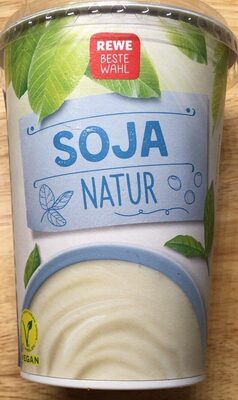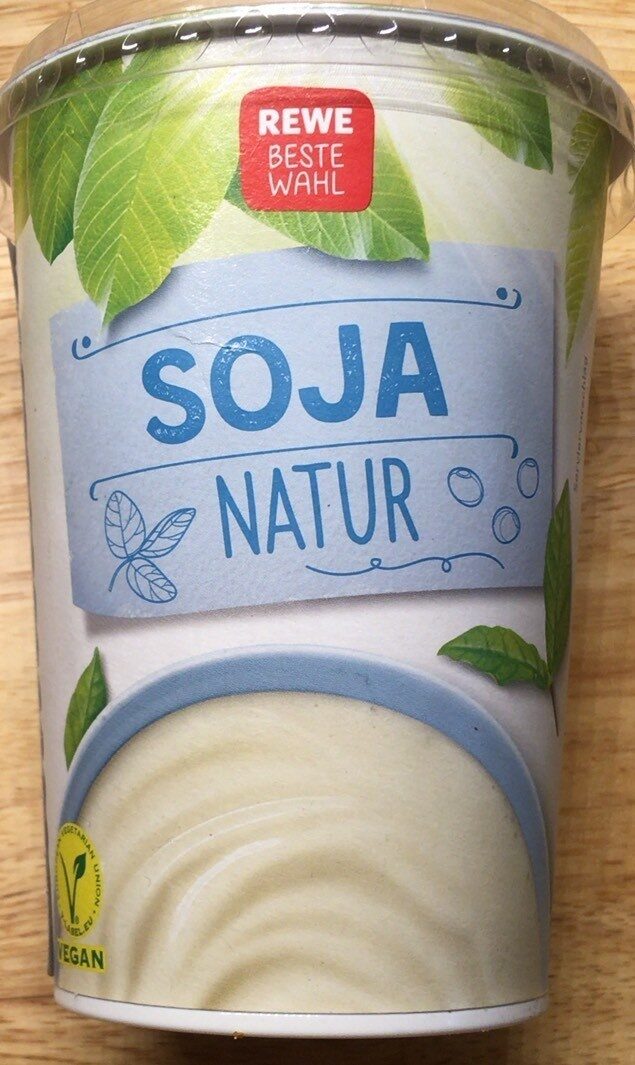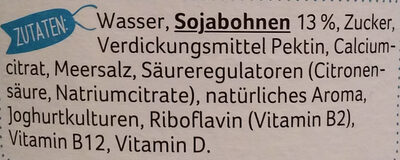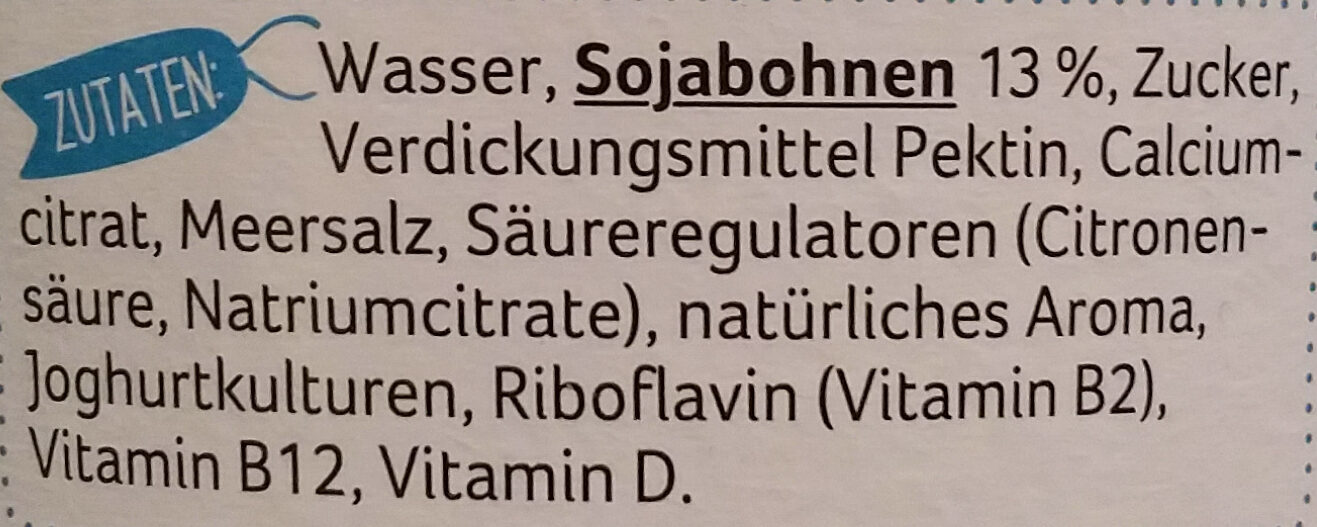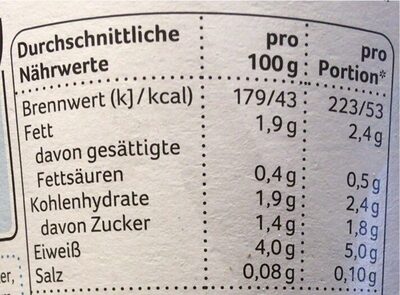Help us make food transparency the norm!
As a non-profit organization, we depend on your donations to continue informing consumers around the world about what they eat.
The food revolution starts with you!
Soja Natur - REWE Beste Wahl - 500 g
Soja Natur - REWE Beste Wahl - 500 g
This product page is not complete. You can help to complete it by editing it and adding more data from the photos we have, or by taking more photos using the app for Android or iPhone/iPad. Thank you!
×
Barcode: 4388860377200 (EAN / EAN-13)
Quantity: 500 g
Packaging: Plastic, Metal, Paper, Recyclable Metals, Aluminium
Brands: REWE Beste Wahl
Categories: Plant-based foods and beverages, Fermented foods, Dairy substitutes, Desserts, Non-dairy desserts, Non-dairy fermented foods, Non-dairy yogurts, Soy milk yogurts, Plain soy yogurts
Labels, certifications, awards:
Vegetarian, Vegan, European Vegetarian Union, European Vegetarian Union Vegan, FSC, FSC Mix


Origin of ingredients: Europe
Manufacturing or processing places: Beckum
Stores: REWE
Countries where sold: Germany
Matching with your preferences
Health
Ingredients
-
17 ingredients
: Wasser, Sojabohnen 13 %, Zucker, Verdickungsmittel Pektin, Calciumcitrat, Meersalz, Säureregulatoren (Citronensäure, Natriumcitrate), natürliches Aroma, Joghurtkulturen, Riboflavin (Vitamin B2), Vitamin B12, Vitamin D.Allergens: Milk, Soybeans
Food processing
-
Ultra processed foods
Elements that indicate the product is in the 4 - Ultra processed food and drink products group:
- Additive: E101 - Riboflavin
- Additive: E440 - Pectins
- Ingredient: Flavouring
- Ingredient: Thickener
Food products are classified into 4 groups according to their degree of processing:
- Unprocessed or minimally processed foods
- Processed culinary ingredients
- Processed foods
- Ultra processed foods
The determination of the group is based on the category of the product and on the ingredients it contains.
Additives
-
E101 - Riboflavin
Riboflavin: Riboflavin, also known as vitamin B2, is a vitamin found in food and used as a dietary supplement. Food sources include eggs, green vegetables, milk and other dairy product, meat, mushrooms, and almonds. Some countries require its addition to grains. As a supplement it is used to prevent and treat riboflavin deficiency and prevent migraines. It may be given by mouth or injection.It is nearly always well tolerated. Normal doses are safe during pregnancy. Riboflavin is in the vitamin B group. It is required by the body for cellular respiration.Riboflavin was discovered in 1920, isolated in 1933, and first made in 1935. It is on the World Health Organization's List of Essential Medicines, the most effective and safe medicines needed in a health system. Riboflavin is available as a generic medication and over the counter. In the United States a month of supplements costs less than 25 USD.Source: Wikipedia
-
E101i - Riboflavin
Riboflavin: Riboflavin, also known as vitamin B2, is a vitamin found in food and used as a dietary supplement. Food sources include eggs, green vegetables, milk and other dairy product, meat, mushrooms, and almonds. Some countries require its addition to grains. As a supplement it is used to prevent and treat riboflavin deficiency and prevent migraines. It may be given by mouth or injection.It is nearly always well tolerated. Normal doses are safe during pregnancy. Riboflavin is in the vitamin B group. It is required by the body for cellular respiration.Riboflavin was discovered in 1920, isolated in 1933, and first made in 1935. It is on the World Health Organization's List of Essential Medicines, the most effective and safe medicines needed in a health system. Riboflavin is available as a generic medication and over the counter. In the United States a month of supplements costs less than 25 USD.Source: Wikipedia
-
E330 - Citric acid
Citric acid is a natural organic acid found in citrus fruits such as lemons, oranges, and limes.
It is widely used in the food industry as a flavor enhancer, acidulant, and preservative due to its tart and refreshing taste.
Citric acid is safe for consumption when used in moderation and is considered a generally recognized as safe (GRAS) food additive by regulatory agencies worldwide.
-
E331 - Sodium citrates
Sodium citrate: Sodium citrate may refer to any of the sodium salts of citrate -though most commonly the third-: Monosodium citrate Disodium citrate Trisodium citrateThe three forms of the salt are collectively known by the E number E331. Sodium citrates are used as acidity regulators in food and drinks, and also as emulsifiers for oils. They enable cheeses to melt without becoming greasy.Source: Wikipedia
-
E440 - Pectins
Pectins (E440) are natural carbohydrates, predominantly found in fruits, that act as gelling agents in the food industry, creating the desirable jelly-like texture in jams, jellies, and marmalades.
Pectins stabilize and thicken various food products, such as desserts, confectioneries, and beverages, ensuring a uniform consistency and quality.
Recognized as safe by various health authorities, pectins have been widely used without notable adverse effects when consumed in typical dietary amounts.
Ingredients analysis
-
Palm oil free
No ingredients containing palm oil detected
-
Vegan
No non-vegan ingredients
Unrecognized ingredients: Vitamin b12, Vitamin D
-
Vegetarian
No non-vegetarian ingredients detected
Unrecognized ingredients: Vitamin b12, Vitamin D
-
Details of the analysis of the ingredients
: Wasser, _Sojabohnen_ 13%, Zucker, Verdickungsmittel (Pektin), Calciumcitrat, Meersalz, Säureregulatoren (Citronensäure, Natriumcitrate), natürliches Aroma, Joghurtkulturen, Riboflavin (Vitamin B2), vitamine, vitamin B12, Vitamin D- Wasser -> en:water - vegan: yes - vegetarian: yes - ciqual_food_code: 18066 - percent_min: 82.16 - percent_max: 87
- _Sojabohnen_ -> en:soya-bean - vegan: yes - vegetarian: yes - ciqual_food_code: 20901 - percent_min: 13 - percent: 13 - percent_max: 13
- Zucker -> en:sugar - vegan: yes - vegetarian: yes - ciqual_proxy_food_code: 31016 - percent_min: 0 - percent_max: 1.4
- Verdickungsmittel -> en:thickener - percent_min: 0 - percent_max: 1.4
- Pektin -> en:e440a - vegan: yes - vegetarian: yes - percent_min: 0 - percent_max: 1.4
- Calciumcitrat -> en:e333 - vegan: yes - vegetarian: yes - percent_min: 0 - percent_max: 1.4
- Meersalz -> en:sea-salt - vegan: yes - vegetarian: yes - ciqual_food_code: 11082 - percent_min: 0 - percent_max: 0.08
- Säureregulatoren -> en:acidity-regulator - percent_min: 0 - percent_max: 0.08
- Citronensäure -> en:e330 - vegan: yes - vegetarian: yes - percent_min: 0 - percent_max: 0.08
- Natriumcitrate -> en:e331 - vegan: yes - vegetarian: yes - percent_min: 0 - percent_max: 0.08
- natürliches Aroma -> en:natural-flavouring - vegan: maybe - vegetarian: maybe - percent_min: 0 - percent_max: 0.08
- Joghurtkulturen -> en:lactic-ferments - vegan: maybe - vegetarian: yes - percent_min: 0 - percent_max: 0.08
- Riboflavin -> en:e101 - vegan: maybe - vegetarian: yes - percent_min: 0 - percent_max: 0.08
- Vitamin B2 -> en:e101 - vegan: maybe - vegetarian: yes - percent_min: 0 - percent_max: 0.08
- vitamine -> en:vitamins - vegan: yes - vegetarian: yes - percent_min: 0 - percent_max: 0.08
- vitamin B12 -> en:vitamin-b12 - percent_min: 0 - percent_max: 0.08
- Vitamin D -> en:vitamin-d - percent_min: 0 - percent_max: 0.08
Nutrition
-
Very good nutritional quality
⚠ ️Warning: the amount of fiber is not specified, their possible positive contribution to the grade could not be taken into account.⚠ ️Warning: the amount of fruits, vegetables and nuts is not specified on the label, it was estimated from the list of ingredients: 13This product is not considered a beverage for the calculation of the Nutri-Score.
Positive points: 2
- Proteins: 2 / 5 (value: 4, rounded value: 4)
- Fiber: 0 / 5 (value: 0, rounded value: 0)
- Fruits, vegetables, nuts, and colza/walnut/olive oils: 0 / 5 (value: 13, rounded value: 13)
Negative points: 0
- Energy: 0 / 10 (value: 179, rounded value: 179)
- Sugars: 0 / 10 (value: 1.4, rounded value: 1.4)
- Saturated fat: 0 / 10 (value: 0.4, rounded value: 0.4)
- Sodium: 0 / 10 (value: 32, rounded value: 32)
The points for proteins are counted because the negative points are less than 11.
Nutritional score: (0 - 2)
Nutri-Score:
-
Nutrient levels
-
Fat in low quantity (1.9%)
What you need to know- A high consumption of fat, especially saturated fats, can raise cholesterol, which increases the risk of heart diseases.
Recommendation: Limit the consumption of fat and saturated fat- Choose products with lower fat and saturated fat content.
-
Saturated fat in low quantity (0.4%)
What you need to know- A high consumption of fat, especially saturated fats, can raise cholesterol, which increases the risk of heart diseases.
Recommendation: Limit the consumption of fat and saturated fat- Choose products with lower fat and saturated fat content.
-
Sugars in low quantity (1.4%)
What you need to know- A high consumption of sugar can cause weight gain and tooth decay. It also augments the risk of type 2 diabetes and cardio-vascular diseases.
Recommendation: Limit the consumption of sugar and sugary drinks- Sugary drinks (such as sodas, fruit beverages, and fruit juices and nectars) should be limited as much as possible (no more than 1 glass a day).
- Choose products with lower sugar content and reduce the consumption of products with added sugars.
-
Salt in low quantity (0.08%)
What you need to know- A high consumption of salt (or sodium) can cause raised blood pressure, which can increase the risk of heart disease and stroke.
- Many people who have high blood pressure do not know it, as there are often no symptoms.
- Most people consume too much salt (on average 9 to 12 grams per day), around twice the recommended maximum level of intake.
Recommendation: Limit the consumption of salt and salted food- Reduce the quantity of salt used when cooking, and don't salt again at the table.
- Limit the consumption of salty snacks and choose products with lower salt content.
-
-
Nutrition facts
Nutrition facts As sold
for 100 g / 100 mlAs sold
per serving (125g)Compared to: Plain soy yogurts Energy 179 kj
(43 kcal)224 kj
(53 kcal)-19% Fat 1.9 g 2.38 g -22% Saturated fat 0.4 g 0.5 g - Carbohydrates 1.9 g 2.38 g -23% Sugars 1.4 g 1.75 g -8% Fiber ? ? Proteins 4 g 5 g -5% Salt 0.08 g 0.1 g -27% Vitamin D 0.75 µg 0.938 µg -11% Vitamin B1 (Thiamin) 0 mg 0 mg Vitamin B2 (Riboflavin) 0.21 mg 0.263 mg Vitamin B6 (Pyridoxin) 0 mg 0 mg Vitamin B12 (cobalamin) 0.38 µg 0.475 µg -98% Calcium 120 mg 150 mg +3% Iodine 0 µg 0 µg Fruits‚ vegetables‚ nuts and rapeseed‚ walnut and olive oils (estimate from ingredients list analysis) 13 % 13 %
Environment
-
Eco-Score B - Low environmental impact
⚠ ️Select a country in order to include the full impact of transportation.The Eco-Score is an experimental score that summarizes the environmental impacts of food products.→ The Eco-Score was initially developped for France and it is being extended to other European countries. The Eco-Score formula is subject to change as it is regularly improved to make it more precise and better suited to each country.Life cycle analysis
-
Average impact of products of the same category: A (Score: 97/100)
Category: Soy dessert, plain, refrigerated
Category: Soy dessert, plain, refrigerated
- PEF environmental score: 0.10 (the lower the score, the lower the impact)
- including impact on climate change: 0.82 kg CO2 eq/kg of product
Stage Impact Agriculture
19.6 %Processing
37.2 %Packaging
15.3 %Transportation
16.6 %Distribution
8.9 %Consumption
2.4 %
Bonuses and maluses
-
Origins of ingredients with a high impact
Malus: -2
Environmental policy: -2
Transportation: 0
Origin of the product and/or its ingredients % of ingredients Impact Europe 100 %High
-
Packaging with a medium impact
Malus: -14
Shape Material Recycling Impact Unknown Heavy aluminium Medium Unknown Plastic High Unknown Paper Low ⚠ ️ The information about the packaging of this product is not sufficiently precise (exact shapes and materials of all components of the packaging).⚠ ️ For a more precise calculation of the Eco-Score, you can modify the product page and add them.
If you are the manufacturer of this product, you can send us the information with our free platform for producers.
Eco-Score for this product
-
Impact for this product: B (Score: 79/100)
Product: Soja Natur - REWE Beste Wahl - 500 g
Life cycle analysis score: 97
Sum of bonuses and maluses: -16
Final score: 79/100 (The score of products with non-recyclable and non-biodegradable packaging materials is capped at 79 (grade B).)
-
Carbon footprint
-
Equal to driving 0.4 km in a petrol car
82 g CO² per 100g of product
The carbon emission figure comes from ADEME's Agribalyse database, for the category: Soy dessert, plain, refrigerated (Source: ADEME Agribalyse Database)
Stage Impact Agriculture
15.9 %Processing
30.9 %Packaging
22.5 %Transportation
25.3 %Distribution
4.5 %Consumption
0.8 %
Packaging
-
Packaging with a medium impact
-
Packaging parts
(Aluminium)
(Plastic)
(Paper)
-
Packaging materials
Material % Packaging weight Packaging weight per 100 g of product Paper or cardboard Plastic Metal Total
-
Transportation
-
Origins of ingredients
Origins of ingredients with a high impact
Origin of the product and/or its ingredients % of ingredients Impact Europe 100 %High
Report a problem
-
Incomplete or incorrect information?
Category, labels, ingredients, allergens, nutritional information, photos etc.
If the information does not match the information on the packaging, please complete or correct it. Open Food Facts is a collaborative database, and every contribution is useful for all.
Data sources
Product added on by moon-rabbit
Last edit of product page on by lamplis.
Product page also edited by ecoscore-impact-estimator, heuwerk, kiliweb, packbot, roboto-app.
